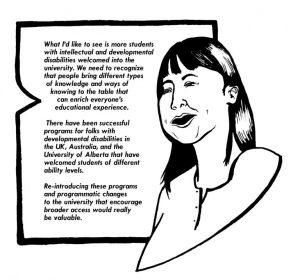2 Community Building and Engagement Beyond McMaster
 Community Engagement with Student Open Circles
Community Engagement with Student Open Circles
Student Open Circles recruits and coordinates more than 400 McMaster students to volunteer as small groups each week at social service agencies in Hamilton. Each group engages in weekly reflection on social issues related to their placement. At our placement with Conway Opportunity Homes, volunteers assist and interact with residents living with physical disabilities through weekly video and phone calls. At our placement with the Learning Disabilities Association of Halton-Hamilton’s Reading Rocks program, volunteers tutor 6–12-year-old children individually who experience barriers in the attainment of early literacy skills twice per week. Over the course of the year, 115 volunteers gave 4,170 hours of service at these two programs. For students who wish to volunteer, visit Open Circle McMaster or come visit us at our office in TSH B110!
Contributors: Jeff Druery (Student Open Circles)
Accessible Entry Points of McMaster Museum of Art
The museum’s education team continued to deliver virtual programs for campus, community, and school groups. Virtual tours are structured to be as accessible as possible by: enabling live captioning; designing accessible formatting for Avenue to Learn, and creating PowerPoint presentations that can be read by an assistive reader with alt text descriptions on all images.
In spring 2021, the museum launched a new website with an improved user experience, and a defaulted template with large font size, high contrast design, and multiple device compatibility to improve text legibility and readability. The eMuseum platform was also upgraded in 2021 to provide an enhanced and more accessible user experience on a full range of devices.
In summer 2021, the museum team completed closed captioning for all videos on our YouTube channel. We also began adding alt-text to images, and materials published on social media.
In the galleries, large font versions of texts are provided, and digital copies are available online. Alternative modes of access to exhibitions have been supported with supplemental digital materials.
Contributors: Elyse Vickers, Communications Officer (McMaster Museum of Art Staff), and Teresa Gregorio, Education Officer (McMaster Museum of Art Staff)
Developing Digital Literacy and Digital Mobility with and for Older Adults
New Horizons for Seniors funded a project to develop digital literacy resources for older adults to support them in developing online skills that would facilitate their connection to people and the community. This is especially important given the isolating nature of the pandemic. The partnership with Centre[3] Artistic and Social Practice, and McMaster faculty (Carmela Laganse, Tara LaRose), produced a large series of short instructional videos on topics such as how to set up an email account, internet safety, and how to set up and use Zoom. With funding from the McMaster Institute for Research on Aging (MIRA) Catalyst grant, we are currently co-developing digital literacy resources for Arabic-speaking older adults in partnership with Centre[3] and the Immigrant Working Centre to improve digital mobility in our underrepresented, immigrant, older adult communities.
This team, along with Vibra Fusion Lab, and Re.Vision, has also been involved in a 3-year Digital Strategies, Canada Council for the Arts grant and project, titled Direct[Message], to co-research / develop / design a digital prototype tool that facilitates social engagement and well-being of older adults through the arts.
Contributors: Carmela Laganse, Tara LaRose, Centre[3] for Artistic and Social Practice, McMaster Institute for Research on Aging, VibraFusion Lab, Re.Vision, and New Horizons for Seniors
Creation of the MIRA | Dixon Hall Centre
The MIRA | Dixon Hall Centre, created in 2021, is a unique partnership between the McMaster Institute for Research on Aging (MIRA), and Dixon Hall, an established multi-service agency located in the heart of downtown Toronto. The newly established Centre seeks to improve engagement with older adults in downtown Toronto who face housing insecurity, barriers to transportation and accessing services in-person, and transitions in care (e.g., hospital-to-home and end-of-life), and who are often underserved and under-represented in research. The Centre’s work has also benefitted from other contributions to Dixon Hall that are currently assisting with technology and accessibility by enabling critical enhancements to client data storage, as well as supporting client connectivity, something that has never been more vital than during the COVID-19 pandemic.
Contributors: The McMaster Institute for Research on Aging (MIRA) and Dixon Hall
Meet My Hamilton – A Digital Opportunity for Community Building
In 2019, the McMaster Institute for Research on Aging (MIRA) together with McMaster Residence Life Services piloted an in-person intergenerational social program that aimed to build relationships across generations, improve social connectivity for both older adults and students, and to dismantle age-related stereotypes. Due to COVID-19, this program was relaunched in a virtual setting as “Meet My Hamilton.” To date, over 70 undergraduate students, and 20 older adults have participated. This virtual program continues to enable people to meet across the ages, and build community. The virtual platform is also more accessible to older adults, who report barriers to physically accessing campus, especially in winter weather.
Contributors: Meet My Hamilton and McMaster Institute for Research on Aging
“My Stroke Recovery Journey”
As part of the CIHR funded Transitional Care Stroke Intervention research projects, we worked with patient partners and healthcare workers to develop a website that meets the unique needs of stroke survivors. Our partners provided us with feedback about how to make the website more accessible for stroke survivors, including easy access to definitions for those experiencing aphasia, as well as a text-to-speech option, and videos. Based on the feedback from patient partners, we also included the use of an accessibility tool that provides features such as an enlarged cursor, a reading mask (which allows sections of text to be highlighted on a screen in comparison to surrounding text), and the ability to change the contrast on the website.
Our patient partners suggested the “My Stroke Recovery Journey” map, developed by the Central South Stroke Network’s Patient and Family Advisory Council, as a framework for the website. This map allows us to organize the information in a way that is accessible and meaningful for stroke survivors.
Contributors: Katie Lee, Kathryn Fisher, Maureen Markle-Reid, Eileen Britt, David Dayler, Ken Hajas, Barb Koetsier, Robert Mahony, Stefan Pagliuso, Jim Prescott, Linda Mayhew, Kimberly Walker (McMaster Aging, Community and Health Research Unit), and the Central South Stroke Network’s Patient and Family Advisory Council
McMaster Athletics and Recreation: Our Sport Fitness School Camp
Our Sport Fitness School camp is a youth program for children ages 6-16 years old. Annually we provide a 1:1 support program for children with disabilities. The program is run at no additional cost to families. The staff that facilitate the program consists of university and high school students who have both a passion for working with youth and inclusion. We strive to provide a fun and inclusive experience for all our campers, and work with families to help them achieve their goals while providing an integrated, enjoyable camp experience. The summer of 2021 was very different for us in many ways as we adjusted our programming due to COVID-19, but it was hugely important that the 1:1 offering remained available. Happy to report that we had a successful summer all around!
Contributors: Lauren Bahrami (Athletics and Recreation Camps) and Noah Gibson (2021 Sports Fitness School 1:1 Program Coordinator)
Visit the Inclusion Coffeehouse!
L’Arche Hamilton is a community where people with and without intellectual disabilities share life together, can reach their full potential, lead lives rich in relationships of mutuality, and have a valid place in society where all can contribute. The Inclusion Coffeehouse will set to open its doors in December 2021. Located in the Bernie Morelli Recreation Centre, the coffeehouse serves many members of the neighbourhood including those of different backgrounds, ages, cultures, faiths, and abilities. L’Arche was able to open this social enterprise coffeehouse and bring it to life as a community space where all can gather and learn about each other while enjoying some delicious treats! In a time when people are longing to belong and know that they matter, we stand for every one of us to share our gifts, deepen our connection, and celebrate our humanity and our need for one another.
Contributors: L’Arche Hamilton, McMaster Equity and Inclusion Office (as contributing communications partner), and the intellectual disability community within Hamilton

